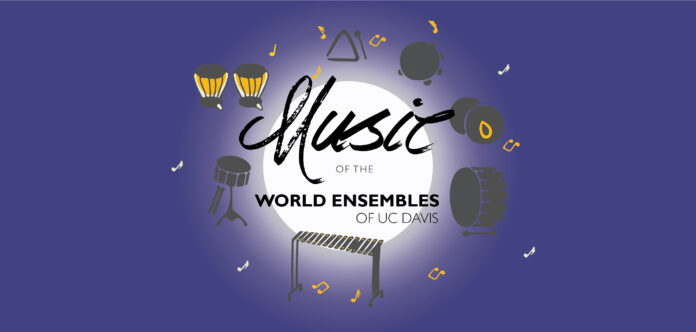Concert to showcase and support ethnomusicology program
The study of ethnomusicology shows that music is more than just organized sound. By digging into the roots of various music styles, ethnomusicology uncovers social and historical meanings unique to its cultural context.
To support our campus’ own ethnomusicology program, the music department is putting on Musics of the World Ensembles of UC Davis, a showcase featuring four of the university’s world music groups. The performance will take place on Fri., April 24, at the Mondavi Center.
The concert will begin with the Korean Percussion Ensemble making a procession from the theater doors to the stage. This opening piece demonstrates the rhythmic of the percussion and dance genre, p’ungmul.
“Many Korean percussion concerts begin with this opening procession as a way to welcome the audience and to figuratively open up the space for the performance,” said Katherine Lee, assistant professor of music and Korean Percussion Ensemble director.
Traditionally performed by villagers during peak harvest cycle times and holidays, p’ungmul symbolizes the significance of community to Korean culture. Lee expressed that to experience the music brings out a strong connection with the culture.
“Many [Korean percussion] ensembles are not linked to Korea in terms of ethnicity, but rather [to] small communities that share an affinity for this kind of percussion music,” Lee said. “In the p’ungmul genre, one has to learn how to walk while performing different rhythms; it is a truly embodied experience.”
Bonding communities is just one of the many ways music demonstrates cultural significances. Ethnomusicology brings into light the many perspectives music cultivates.
Henry Spiller, associate professor and chair for UC Davis’ department of music, has pursued ethnomusicology ever since his first Gamelan music class. Gamelan is a traditional music genre from Indonesia, played through mostly percussive instruments. While demonstrating the ways music shapes identities, Spiller’s focus on Gamelan also introduced new insights to music as a whole.
“Musical talent is a myth,” Spiller said. “All humans must be musical to survive, and musicality appears in many forms. Music is [also] not a universal language; it is just as easy to misunderstand and misinterpret as words.”
Spiller also directs the UC Davis Gamelan Ensemble, which is also performing at the concert. According to Spiller, the ensemble will play a dynamic set list consisting of a choral piece, a dance piece and a piece that blends gamelan with Western themes.
“We will perform three pieces on two different sets of gamelan instruments,” Spiller said. “The [choral piece’s] lyrics describe fragrant flowers in a pleasure garden and how they compare to beautiful women, of course. [For the dance piece,] we have invited Bay Area dancer Margot Lederer Prado [to perform] ‘Tari Topeng Menak Jingga,’ a masked dance [that] portrays a king whose lust has overcome him. [The last piece combines] European medieval compositional techniques with gamelan idioms.”
The concert also features performances by the Hindustani Vocal Ensemble and the UC Davis Samba School. The Hindustani Vocal Ensemble explores the music of North India. Led by Rita Sahai, the group takes on various ragas (melodic systems traditionally representing certain feelings, times of day and holidays), exemplifying music’s integral role to everyday life.
The UC Davis Samba School, led by Chris Froh, strikes charismatic beats, commemorating the music of Brazilian Carnival, a festival traditionally meant to be one last celebration before Catholic custom Lent. Stephanie Swalberg, a former member of the samba school and a fourth-year communication major, relished the way the ensemble introduced her to another culture’s interpretation of music.
“My experience in Samba was great!” Swalberg said. “It was fun emerging myself in a different genre of music and playing different instruments.”
Whether through the high-energy of Samba or the dynamic expressiveness of Hindustani vocals, Sundanese Gamelan and Korean percussion, the Musics of the World performance will illustrate the manners in which music moves us together, but also makes us unique. By immersing audiences into diverse styles of sound, the performance showcases the significance of ethnomusicology through the very ways of the study itself.
“I think it’s important for people, and students alike, to expose themselves to different music of different cultures because we gain more perspective,” Swalberg said. “We have a better understanding of this magnificent world around us just by learning another culture’s music.”
For further event and ticketing information, please visit the Mondavi Website.
Graphic by Sandra Bae.




